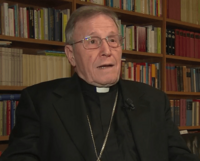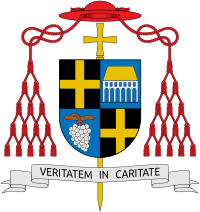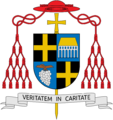Walter Kasper facts for kids
Quick facts for kids His Eminence Walter Kasper |
|
|---|---|
| President Emeritus of the Pontifical Council for Promoting Christian Unity | |
 |
|
| See | Rottenburg-Stuttgart (Emeritus) |
| Appointed | 3 March 2001 |
| Reign ended | 1 July 2010 |
| Predecessor | Edward Idris Cassidy |
| Successor | Kurt Koch |
| Other posts | Cardinal Priest of Ognissanti in Via Appia Nuova |
| Orders | |
| Ordination | 6 April 1957 |
| Consecration | 17 June 1989 by Oskar Saier |
| Created Cardinal | 21 February 2001 |
| Personal details | |
| Birth name | Walter Kasper |
| Born | 5 March 1933 Heidenheim an der Brenz, Weimar Republic |
| Nationality | German |
| Denomination | Catholic Church |
| Previous post |
|
| Motto | Veritatem in caritate ("truth in charity") |
| Coat of arms |  |
| Styles of Walter Kasper |
|
|---|---|
 |
|
| Reference style | His Eminence |
| Spoken style | Your Eminence |
| Informal style | Cardinal |
| See | Rottenburg-Stuttgart (Emeritus) |
Walter Kasper (born 5 March 1933) is a German Catholic cardinal and a theologian. A theologian is someone who studies religious beliefs and practices. He used to be the President of the Pontifical Council for Promoting Christian Unity. He held this important role from 2001 to 2010.
Contents
Early Life and Studies
Walter Kasper was born in Heidenheim an der Brenz, Germany. He became a priest on 6 April 1957. Bishop Carl Leiprecht of Rottenburg ordained him.
From 1957 to 1958, he worked as a local priest in Stuttgart. He then went back to school. He earned a special degree called a doctorate in dogmatic theology from the University of Tübingen. Dogmatic theology is the study of the main beliefs of a religion.
He taught at the University of Tübingen from 1958 to 1961. He also worked as an assistant to other important scholars. Later, he taught dogmatic theology at the University of Münster from 1964 to 1970. In 1969, he became the dean of the theology department there. He held the same position at Tübingen in 1970. In 1983, Kasper was a visiting professor at The Catholic University of America. He also edited a big dictionary of theology and church matters.
Becoming a Bishop
On 17 April 1989, Walter Kasper was chosen to be the Bishop of Rottenburg-Stuttgart. This is Germany's fourth-largest Catholic area, called a diocese. He officially became a bishop on 17 June of the same year. Archbishop Oskar Saier helped consecrate him.
In 1993, Bishop Kasper and other German bishops signed a letter. This letter suggested that divorced Catholics who had remarried could receive sacraments. Sacraments are important religious ceremonies. This idea was not supported by Pope John Paul II or Cardinal Ratzinger at the time. In 1994, he became a co-leader of a group. This group worked on talks between Lutherans and Catholics.
Becoming a Cardinal
Pope John Paul II made Walter Kasper a cardinal on 21 February 2001. This happened during a special meeting called a consistory. He was named a Cardinal-Deacon.
Cardinal Kasper was part of a group of cardinals and bishops. They met every year from 1995 to 2006 in Switzerland. They discussed ways to make changes in the Church. These changes included how bishops are chosen. They also talked about the role of the Pope.
When Pope John Paul II passed away in 2005, Cardinal Kasper's role ended. However, he was one of the cardinals who could vote for a new Pope. This vote happens in a meeting called a papal conclave. On 21 April 2005, Pope Benedict XVI became the new Pope. He then confirmed Cardinal Kasper in his role.
On 21 February 2011, Cardinal Kasper was promoted to Cardinal-Priest. This is a higher rank for a cardinal.
Cardinal Kasper was the oldest cardinal who could vote in the Papal conclave of 2013. He was 79 years old when Pope Benedict XVI resigned. His 80th birthday was on 5 March 2013. This was five days after the Pope's resignation. He could no longer vote after that conclave ended.
Work for Christian Unity
On 3 March 1999, Cardinal Kasper became the Secretary of the Pontifical Council for Promoting Christian Unity. This council works to bring different Christian churches closer together. He also became the President of the group that deals with relations with Jewish people. He then left his position as Bishop of Rottenburg-Stuttgart.
Building Bridges with Jewish People
Cardinal Kasper understood that a Church document from 2000 was upsetting to many Jewish people. He said it was not the end of talks. Instead, he called it a chance for more important discussions between Catholics and Jews.
In 2003, he wrote about fighting against hatred towards Jewish people. In 2004, he received an award. This award was for his work in helping Jews and Catholics understand each other.
International Theological Commission
Cardinal Kasper was a member of the International Theological Commission. This group gives advice to the Church's teaching office. He often led the Catholic delegation to visit the Ecumenical Patriarchate in Constantinople. This was for a special religious holiday. In 2007, he led the Catholic group to the funeral of a leader of the Romanian Orthodox Church.
Comments on Britain
In September 2010, Cardinal Kasper did not attend a papal visit to Great Britain. Reports said he had described Heathrow Airport as looking like a "Third World country." He also said that the United Kingdom had "a new and aggressive atheism." His secretary explained that his airport comment was about the many different people living in Britain. The secretary also said that "aggressive atheism" referred to people like Richard Dawkins. These people have been very critical of the Pope.
A Church spokesman in Britain said Cardinal Kasper's comments were not the views of the Vatican. Cardinal Kasper's secretary said he did not travel because of a health issue.
Pope Francis's View
Pope Francis became Pope in March 2013. Four days after his election, he called Cardinal Kasper "a clever theologian, a good theologian." Pope Francis said that Cardinal Kasper's book on mercy had helped him a lot.
Discussion on Marriage and Communion
Cardinal Kasper suggested allowing some Roman Catholic couples who have remarried to receive communion. This was a very debated topic. On 21 February 2014, he said that the Church cannot change Jesus's words about marriage being forever. However, he also said that new ways could be explored. This was to help divorced people who have remarried and want to return to the sacraments.
Some cardinals did not agree with his idea. They wrote a book to argue against it. Cardinal Kasper later said that Pope Francis did not support his specific proposal. However, he praised Pope Francis's later document on family life. He said it allowed divorced and remarried people to receive communion in some special cases.
2014 Synod of Bishops
During a meeting of bishops in 2014, Cardinal Kasper spoke to reporters. He said that some countries have a "taboo" against homosexuality. He said they should not tell other countries what to do. After this was reported, he denied saying it. However, a reporter later shared a recording that showed he had made the comments.
Cardinal Kasper later confirmed the conversation. He apologized if his remarks about Africans were seen as insulting. He said he highly respects African culture. He also said that some Catholic media were trying to harm his reputation.
On Jesus Christ
In his book The God of Jesus Christ, Cardinal Kasper wrote about suffering. He said that Jesus gave suffering "the import of love." He explained that early Christian thinkers believed God could choose to feel compassion. This means God could experience suffering. Kasper quoted an early writer who said, "First God suffered, then he came down. What was the suffering he accepted for us? The suffering of love." This writer added that both the Son and the Father suffer in this way. This is possible because of God's freedom in love.
Cardinal Kasper's book Jesus The Christ (1974) looks at Jesus in different ways. It uses a modern approach, a historical approach, and a factual approach. The book also discusses Jesus's resurrection, his mystery, and his role as a priest. The book also talks about the Church. It sees the Church as connected to Jesus himself. This is because Jesus not only taught things but also acted.
Images for kids
See also
 In Spanish: Walter Kasper para niños
In Spanish: Walter Kasper para niños
 | Selma Burke |
 | Pauline Powell Burns |
 | Frederick J. Brown |
 | Robert Blackburn |


